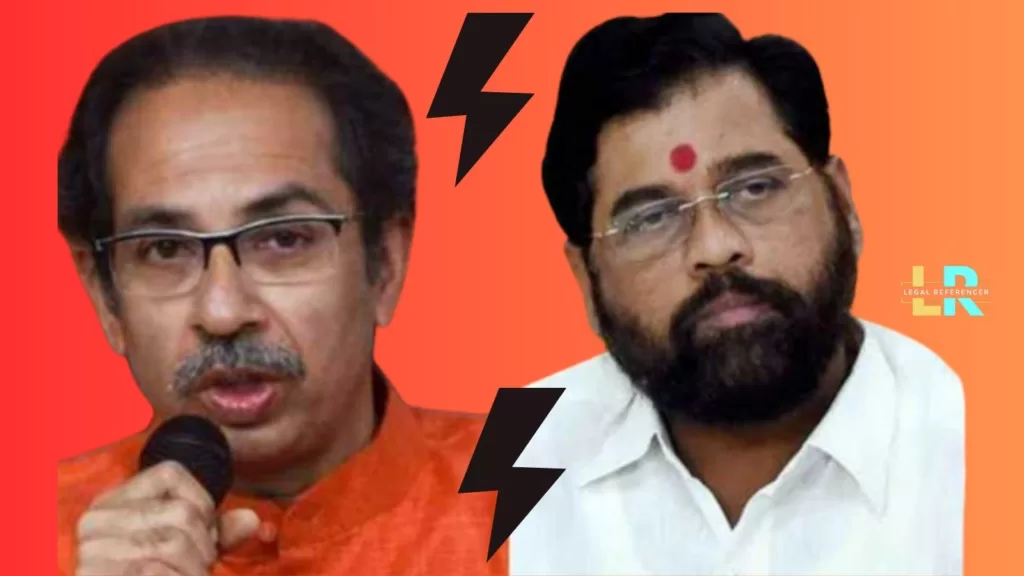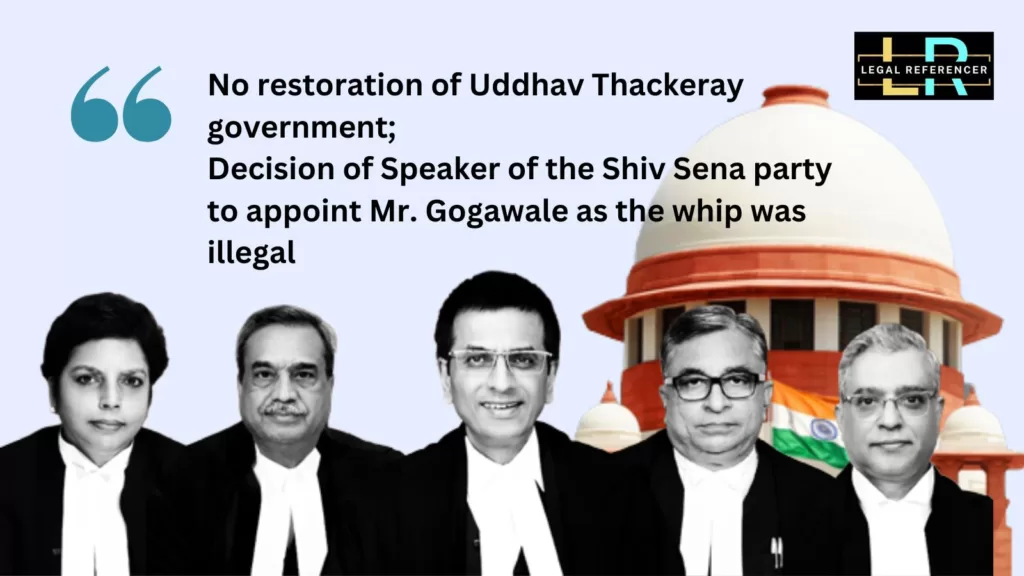The Supreme Court Constitution bench has rendered a verdict regarding the Shiv Sena conflict. The Court has stated that it cannot order the reinstatement of Uddhav Thackeray’s administration since he voluntarily resigned without undergoing a floor test. Consequently, the Court has determined that the Governor acted correctly in inviting Ekanth Shinde to form a new government with the support of the BJP.
The Court remarked that had Mr. Uddhav Thackeray opted not to resign as Chief Minister, it would have considered the possibility of restoring the government under his leadership. Nevertheless, the bench held that it cannot nullify a resignation that was tendered voluntarily. The Supreme Court has provided reassurance to the state government, stating that the Rebiba case will be heard by a larger bench of 7 judges.
The court also found that the Governor’s decision to order a floor test for the Maha Vikas Aghadi government and the Speaker’s decision to appoint the whip nominated by the Shinde group were erroneous. The Constitution Bench, consisting of Chief Justice of India DY Chandrachud, Justice MR Shah, Justice Krishna Murari, Justice Hima Kohli, and Justice PS Narasimha, heard the case from February 14, 2023, and reserved its judgment on March 16, 2023.
No restoration of Uddhav Thackeray government
Although the Supreme Court found that the Governor and the Speaker had made errors, it declined to restore the Uddhav Thackeray government to its previous state as requested by Thackeray’s faction. The reason for this was that Thackeray had voluntarily resigned from his post without undergoing a floor test, meaning that the court could not order his restoration. The court held that the Governor’s decision to administer the oath to Ekanth Shinde with the support of the BJP, the largest party, was therefore justified. Therefore, the status quo ante could not be restored, according to the court.

Decision of Speaker of the Shiv Sena party to appoint Mr. Gogawale as the whip was illegal
The Supreme Court has declared that the appointment of Mr. Gogawale as the whip by the Speaker of the Shiv Sena party, supported by the Shinde group, was illegal. The Court emphasized that the appointment of the whip should be made by the legislative party, not by the Speaker, as the whip appointed by the political party is crucial under the tenth schedule. The Court also noted that the Speaker was aware of the two factions in the legislative party but failed to identify the authorized whip appointed by the political party.
The Court stated that no group or faction could claim to be the original party in defense of disqualification proceedings, and the defense of a split is no longer available under the tenth schedule. The Governor’s decision to call for a floor test was also found to be unconstitutional as he had no objective material to doubt the confidence of the government. The resolution relied on by the Governor did not indicate that MLAs wanted to withdraw support, and even if they did, they only constituted a faction.
The Court also held that a floor test cannot be used to resolve internal party disputes, and the Governor has no power to interfere in intra-party or inter-party conflicts. The Court has determined that the decision of the Governor to order a floor test and the Speaker’s decision to appoint the whip nominated by the Shinde group were erroneous. The judgment in Nabam Rebia has been referred to a larger bench, which has reserved its judgment after hearing the case from February 14, 2023.
The Nabam Rebia case:
The Nabam Rebia case has raised a crucial issue that has been referred to a larger bench by the Chief Justice of India. The issue pertains to the limitations on adjudicating disqualification petitions under the tenth schedule of the Constitution when a notice of intention to remove a speaker has been issued. However, the current proceedings did not directly involve this issue.
Origin:
The case originated from petitions filed by members of the Shinde and Uddhav Thackeray groups, where they raised various concerns. In June 2022, Eknath Shinde filed the first petition, challenging notices issued by the Deputy Speaker against rebels under the tenth schedule for alleged defection. Later, the Uddhav Thackeray group filed petitions in the Supreme Court, challenging the Maharashtra Governor’s decision to call for a trust vote, the swearing-in of Eknath Shinde as the Chief Minister with the backing of BJP, and the election of a new Speaker, among other issues.
The bench heard the matter on merits from February 21. Senior advocates Kapil Sibal, Dr. Abhishek Manu Singhvi, and Devadatt Kamat appeared on behalf of the Uddhav Thackeray side, while senior advocates Neeraj Kishan Kaul, Harish Salve, Mahesh Jethmalani, and Maninder Singh argued for the Shinde side. The Solicitor General of India, Tushar Mehta, appeared on behalf of the Maharashtra Governor.

Issues raised :
issues related to the Tenth Schedule of the Indian Constitution, which deals with disqualification of members of legislative bodies on grounds of defection. These issues are as follows:
A. Whether the Speaker, who has received a notice of removal, can continue the disqualification proceedings under the Tenth Schedule, as held by the Court in Nabam Rebia.
B. Whether a petition under Article 226 and Article 32 lies, inviting a decision on a disqualification proceeding by the High Courts or the Supreme Court.
C. Can a court declare a member disqualified for their actions, without a decision by the Speaker?
D. What is the status of proceedings in the House during the pendency of disqualification petitions against members?
E. If the Speaker decides that a member incurred disqualification under the Tenth Schedule, does it relate back to the date of the complaint? If so, what is the status of proceedings that took place during the pendency of the disqualification petition?
F. What is the impact of the removal of Para 3 of the Tenth Schedule, which omitted “split” in a party as a defense against disqualification proceedings?
G. What is the scope of the power of the Speaker to determine the whip and leader of the legislative party?
H. What is the interplay between the provisions of the Tenth Schedule?
I. Are intra-party questions amenable to judicial review, and what is the scope of the same?
J. Power of the governor to invite a person to form the government and whether the same is amenable to judicial review.
K. What is the scope of the powers of the Election Commission of India with respect to deter an ex parte split within a party?
These issues are of significant importance in Indian politics, and the larger bench will examine them to provide clarity and guidance on these matters.
Also Read: https://legalreferencer.in/martp-act-1966/
Arguments by the Uddhav Thackeray faction:
The Uddhav Thackeray faction presented several arguments in the case. First, they requested the restoration of the status quo ante as on June 27, 2022, asserting that the new government had been elected due to the orders passed by the court on June 27 and June 29. They argued that an initial judicial error would result in all subsequent consequences to fall through.
Secondly, they contended that the Shinde faction did not argue that there was a split in the party, yet the ECI recognized a split in the party. The tenth schedule did not acknowledge split as a defense, and the only defense against disqualification was merging with another party. Para 3 of the tenth schedule, which accepted split as a defense, was deleted. Therefore, full weight had to be given to that intention of deletion. They further argued that due to split not being recognized as a defense, it was immaterial if the Shinde group was the majority within the legislature or not.
Thirdly, they submitted that if the court upholds the Eknath Shinde faction as the official Shiv Sena, it could set a precedent for toppling down any government and would enable defections. The purpose of the 52nd amendment was to prevent the destabilization of the government by bulk defection, but that was precisely what had happened in the present case.
Fourthly, they objected to the newly elected Speaker replacing the whip and the legislative party leader of Shiv Sena appointed by the party Chief Uddhav Thackeray. They argued that it was not for the Speaker to make such appointments but for the Party Chief. The Speaker’s appointments were clearly biased, leading to a lack of confidence in this constitutional authority.
Fifthly, they argued that the 40 MLAs who joined the Shinde camp had no defense under the tenth schedule. Members of the legislative assembly could not act independently of their political party. Furthermore, through his actions, Eknath Shinde had per se voluntarily given up the membership of the house.
It was contended that the Governor lacked the legal authority to acknowledge the rebel MLAs of a political party and validate their conduct, since the responsibility to recognize the representatives of a political party was vested with the Election Commission.
The group led by Eknath Shinde presented multiple arguments, including that:
- The Governor was obliged to conduct a floor test once it became apparent that the Ministry did not have a majority. They argued that the Governor was right to call for a floor test as a significant number of MLAs had expressed their lack of support for the Ministry.
- The Shinde faction claimed to represent the authentic Shivsena, and they believed that the Election Commission had acknowledged them as such.
- The faction also argued that there was no distinction between the legislature party and the political party, and that the former had the authority of the latter.
- The Shinde group maintained that the issue was political in nature and not within the courts’ purview. They contended that the Speaker could not determine which faction represented the actual political party, as that was the Election Commission’s responsibility.
- They asserted that the “but-for test” did not apply to Uddhav Thackeray’s resignation because he did not undergo a floor test, and the Governor’s responsibility was to call for a floor test, not to determine the majority.
- Lastly, they argued that intra-party dissent was a legitimate aspect of the constitutional framework and democracy and should not be deemed illegal.
Also Read: Delhi High Court Rules in Trademark Suit